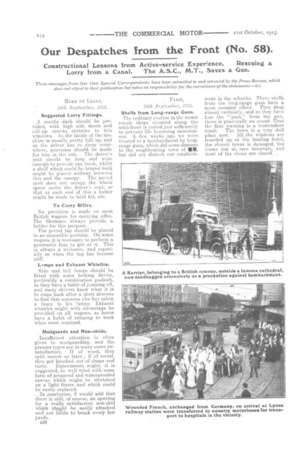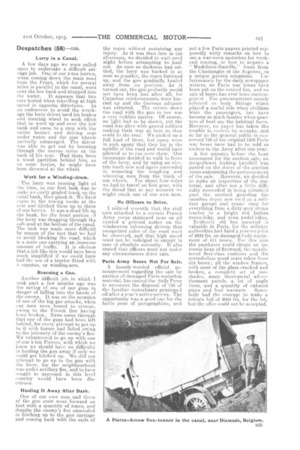Our Despatches from the Front (Non 58).
Page 4

Page 5

If you've noticed an error in this article please click here to report it so we can fix it.
Constructional Lessons from Active-service Experience. Rescuing a
Lorry from a Canal. The A.S.C., M.T., Saves a Gun.
These messages from Our Own Special Correspondents have been submitted to and censored by the Press Bureau, which does not abject to their publication but takes` no responsibility for the correctness of the statements.—ED.
HOME ON LEAVE, 16th September, 1315, Suggested Lorry Fittings.
A scuttle dash should be provided, with high side doors and roll-up canvas curtains to talc windows. As the inside of the machine is usually pretty full up, and as the driver has to sleep somewhere, provision should, be made for him in the cab. . The driver's seat should be long and wide 'enough to provide one bunk, whilst a shelf which could be hinged back might be placed midway between this and the canopy. The petrol tank does not occupy the whole space under the driver's seat, so that at each end of this a locker might be made to hold kit, etc.
To Carry Rifles.
No provision is made on most British wagons for carrying rifles. Thi., Germans always provide a htdcler for this purpose.
The petrol tap should be placed in an accessible position. On same wagons it is necessary to perform a gymnastic feat to get at it. This is always a nuisance, and especially so when the tap has become stiff.
Limps and Exhaust Whistles.
Side and tail lamps should be fitted with some locking device, preferably a combination padlock, as they have a habit of jumping off, and many drivers know what it is .to come back after a short absence to find that someone else has taken a fancy to his lamps. Exhaust whistles might with advantage be provided on all wagons, as horns have a habit of refusing to work when most required.
Mudguards and Non-skids.
Insufficient attention is often given to mudguarding, and the present types are in many cases unsatisfactory. If of wood, they split sooner or later ; if of metal. they get knocked out of shape and rusty. Experiments might. it is • suggested, be well tried with some form of prepared and waterproofed canvas which might be stretched on a light frame and which could be easily replaced.
:In conclusion, would add that there is still, of course, an opening for a really satisfactory non-skid which -shgeld be easily attached and not liable to break every few yards. Shells from Long-range Guns.
The ordinary routine in the motor repair Shops situated along the -semi-front is varied just sufficiently to. prevent life becoming monotonous. A few weeks ago we were treated to a bombardment by longrange guns, which did some damage to the neighbouring town of
but did not disturb our establish ment in the suburbs. These shells from the long-range guns have a most uncanny effect. They drop almost vertically, and as they have lost the "push" from the gull, there is practically no sound. Thus the first warning is a tremendous crash. The town is a very dull place no*. All the windows arc boarded up at the leading .hotel, the Church tower is damaged, the trams run at, rare intervals, and most of the. shops are closed. , Lorry in a Canal.
A few days ago we were called upon to undertake a difficult salvage job. One of our 5-ton lorries, when coming down the main road from the Front, which for several miles is parallel to the canal, went ever the low bank and dropped into lire water. It appears that two ears fouled when travelling at high speed in opposite directions. In an endeavour to avoid the wree.kage the lorry driver used his brakes ined steering wheel to such effect that he went up and over the low bank and came to a stop with the entire bonnet and driving seat under water and the rear wheels partially submerged. The driver was able to get out by bursting through the canvas cover at the back of his seat. Had there been a wood partition behind him, as on some lorries, he might have been drowned at the wheel.
Work for a Winding-drum.
The lorry was running light at the time, so our first task was to make an easily graded track up the canal bank, then plank it. We fixed ropes to the towing hooks at the rear and hitched them up to three of our lorries. It was a dead lift up the bank, for the front portion of the lorry was dragging through the soft mud at the bottom of the canal. The task was made more difficult by reason of the fact that we had to avoid blocking the road, which is a main one carrying an immense amount of traffic. It is obvious that a job like this would have been much simplified if we could have had the use of a tractor fitted with a capstan, or winding-arm.
Rescuing a Gun.
Another difficult job in which I took part a few months ago was the saving of one of our guns in danger of falling into the hands of the enemy. It was on the occasion of one of the big gas attacks, when our men were forced to retreat, owing to the French line having been broken. News came through that one of the guns had been left behind, for every attempt to get. up to it with horses had failed owing to the intensity of the enemy's fire. We volunteered to go up with one or our 5-ton Pierces, with which we knew we should have no difficulty in hauling the gun away if only we could get hitched up. We did not ttempt to go up to the gun with the lorry, for the neighbourhood was under artillery fire, and to have sought to approach in this level country would have been disastrous.
Hauling It Away After Dark.
One of our own men and three of the gun crew went forward on foot with a quantity of -rapes, and despite the enemy's fire succeeded in hitching up to the gun carriage and coming back with the ends of the ropes without sustaining any injury. As it was then Iate in the afternoon., we decided to wait until night before attempting to haul out. As soon as darkness had settled, the lorry was backed in as near as possibie, the ropes fastened up, and the gun gradually hauled away from its position. As it turned out, the gun probably would not have been lost after all, for Canadian reinforcements were hurried up and the German advance was arrested. The return down the road with the gun in tow was a very ticklish matter. Of course, no light had to be shown, yet the road. was alive with gassed soldiers making their way as best as they could to the rear. We picked upa full load of them, but many were in such agony that they lay in the middle of the road and would have allowed us to run over them. Our lieutenant decided to walk in -front of the lorry, and by using an electric torch now and again succeeded in removing the coughing and wheezing men from the track of our wheels. For about four miles we had to travel on first gear, with the dread that at any momentWe might crush one of our • own men.
No Officers to Drive.
I nOticed recently that the staff cars attached to a, certain French Army corps stationed near us all carried a printed notice on the windscreen informing drivers that recognized rules of the road must be observed, and that high speed
i must not be ndulged in except case of absolute necessity. IL also stated that officers must not under any circumstances drive cars.
Paris Army Buses Not For Sale.
A loosely-worded official announcement regarding the sale by auction of damaged Paris motorbus material, has caused the daily Press to announce the disnosal of 756 of the familiar motorbuses pensioned off after a year's active service. The opportunity was a good one for the. facile pens of paragraphists, and
not a few Paris papers printed supposedly witty remarks on how to use a. war-worn motorbus for weekend touring, or how to acquire a " Madeleine-Bastille," fresh from the Champagne or the Argonne, as a unique garden ornament. L, fortunately for the daily newspaper writers, no Paris war buses have been put on the retired list, and no sale of buses has ever been contemplated. The announcement merely referred to body fittings which played a useful role when civilians were the passengers, but have beeome-so much-lumber when quarters Of beef are the habitual fares. However, no paper has taken the trouble to correct its mistake, and so far as the general public;-is concerned 756 of the original 1200 Paris war buses have had to be sold as useless to the Army after one year.
A few minutes before the hOur announced for the auction sale, an insignificant looking handbill was pasted on the doors of the auction • room announcing the postp omen eat of the Sale. However, we.decided to make an inspection of the terial, and after not a little difficulty succeeded in being admitted past the sentinel guarding the -omnibus depot now used as a tary garage and repair shop for everything from a. dirty-grey steam tractor to a bright. red Indian motor-bike, and even pedal-bikes.
Evidently old bus. material valuable in Paris, for the military authorities had fixed a reserve price of 2932 frs. on damaged body-equipment of 411 buses. For this sum the purchaser could obtain an nil, inense heap of firewood, the upholstered first-class cushions and the second-class wood seats taken from 414 buses ; all the window frames, with most of the glass cracked and broken, a complete set of sunshades, many sheet-metal advertisement panels, a lot of angle irons, and a quantity of exhaust pipes and foot warmers. Somebody had the courage to make a private bid or 2000 frs. for the lot, but the offer could not be accepted.




















